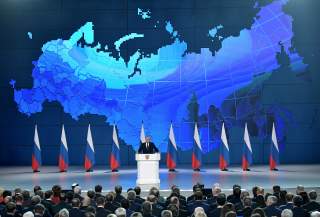Russia Sees Its Future in China and Eurasia
Putin’s ambitions reach beyond Russia’s near abroad and to the international system itself, in which it seeks to regain and retain its position as a great power.
In the Crosshairs
Russia and China were explicitly mentioned in the 2018 National Defense Strategy as the great powers with which the United States is in competition. Both Russia and China have come a long way since the 1990s, and the “friendship” that emerged in the immediate post-Tiananmen period and continued to grow over the years now today appears to be one of the strongest bilateral alliances on the planet. Not only does the alliance provide each country with a secure rear flank, technology transfers and weapons sales support each other’s military-industrial complexes and military modernization. While Russia is still ahead of China in certain areas, including maritime, aviation, and weapons systems, the Kremlin knows that this edge will likely give way in the next ten to twenty years, as China emerges as the more advanced and powerful of the pair. Hence the focus of acting Secretary of Defense Patrick Shanahan on “China, China, China,” for all indications are that in the long-term China will dwarf Russian military power and present the greatest threat to U.S. interests and national security.
Together, Russia’s influence on its former Soviet neighbors and Moscow’s strategic alliance with Beijing in pursuit of a multipolar world form the two main pillars upon which Putin’s grand strategy rests. All other aspects of its foreign policy behavior can be traced back to this dual-pronged grand strategy. As the 2018 National Defense Strategy puts it, “Russia seeks veto authority over nations on its periphery in terms of their governmental, economic, and diplomatic decisions, to shatter the North Atlantic Treaty Organization and change European and Middle East security and economic structures to its favor.” These, in a nutshell, are the objectives of Russia’s grand strategy. All of Moscow’s machinations—both foreign and domestic, from clamping down on civil liberties at home to meddling in Venezuela’s revolution abroad, are all in support of these larger strategic objectives.
Christopher Marsh, Ph.D. is the president of the Special Operations Research Association (SORA) and editor of Special Operations Journal. He is also a defense contractor in the special operations community. Previously, Dr. Marsh was a professor of strategic studies at the U.S. Army School of Advanced Military Studies in Fort Leavenworth, KS.
Image: Reuters

